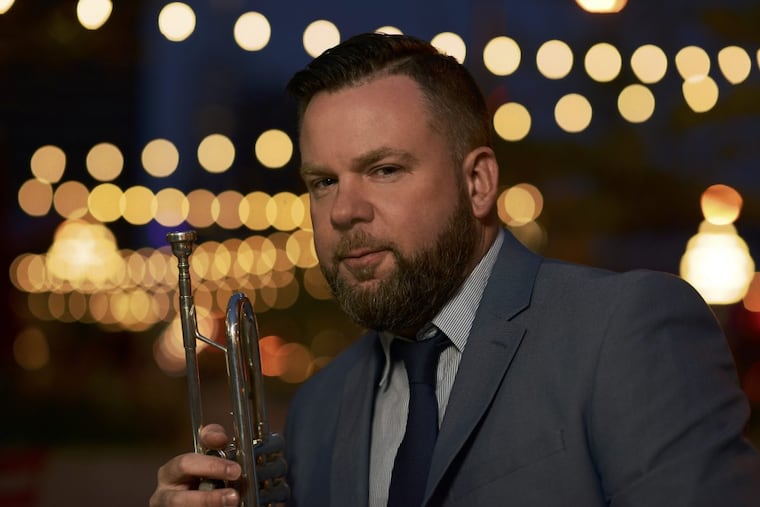Trumpeter Matt Cappy has played with Michael Jackson, the Roots, and Jay Z. He's finally releasing his first solo album
He's played on studio sessions for the Roots, Michael Jackson, Elvis Costello, Marah, John Legend, the Mavericks, and gospel great Marvin Sapp, and each has proved a perfect setting for his muted, holy, breathy brass tone.

Judging from his resumé, Berlin, N.J., trumpeter and flugelhorn player Matt Cappy likes to mix things up. He's played on studio sessions for the Roots, Michael Jackson, Elvis Costello, Marah, John Legend, the Mavericks, and gospel great Marvin Sapp. Each has proved a perfect setting for his muted, holy, breathy brass tone that's hotly reminiscent of great trumpeters Mark Isham and Rene Lopez.
"I always wanted to be known as an assassin on my instrument," Cappy says of his musical killer instincts. "That's not always about doing something fancy, either. Keep it simple. Do your fill. Make it powerful. Make it breathe better."
Cappy, the eternal sideman, has moved front and center with Church and State, his first solo album. He marks the occasion with a show at Johnny Brenda's on Friday.
It took eight years to record Church and State, a process hampered by Cappy's status as an excellent sideman. "Honestly, you go on these tours with Jay Z, Jill [Scott], or Kirk Franklin, as I have. You record on classics like Marah's Kids in Philly or Michael Jackson's Invincible. You get more confident in what you've done and recognize what you must do better. I had learned how to speak my voice within their music and added great qualities to their sound. The phone keeps ringing, so I knew I was doing that right, sustaining that," says Cappy.
"But my personality has always been one where I'm in the leader role, and I knew there had to be more. Luckily, at this age, I'm not a vocalist, so I don't have to worry about being a Justin Bieber. I can mature with my art. I just finally wanted my voice — my compositional voice and my trumpet voice — to be out front this time, and not on the side."
The University of the Arts-educated Cappy, 43, has always played on both sides of the rock and soul-jazz fence in Philly. He was a member of early 1990s ska band Freakin' Cads but was truly recognized as an individual player while jamming at the now-defunct Wilamena's in the late 1990s. There, he found a place playing for two important Philadelphia stalwarts of the era. "Wilamena's is where I played with Jill [Scott] and became part of her Fatback Taffy band. But that's when I also first hooked up with Marah, too, after having done that whole ska thing.
"I would tell Jill that Marah was, pound for pound, the best rock band with horns in America and tell Marah all about Jill's vocal prowess, and both sides went blank. They didn't know what I was talking about. It was a small scene then, but a big, broad scene, too."
Though Cappy is able to jump genres, it's jazz that drives his debut album. But upon further listening to Church and State, there are other traditions that Cappy considers and adheres to: those of classical music and sacred song.
"There are amazing trumpeters in the classical game, but I'm a different version of all that. I'm trying to bring the essence of who I am — my soul, my humanness — to that game," Cappy says. "Same with church songs, noble and angelic."
Berlin United Methodist Church on White Horse Pike is where Cappy rolls holiest. His grandfather on his mother's side was a Methodist minister in West Virginia; he knew well the sensitivity of the music, and he gave Cappy the fundamentals when it came to God's song. With that, the trumpeter has given his heart and soul to his ecclesiastical community. "I have played 'The Butterfly Song' in church in my time," he says.
Church and State includes a sonorous "Nessun Dorma," an "Ave Maria" that becomes a soft samba, and "Amazing Grace" featuring Marsha Ambrosius that is both stately and sinewy. These reimagined masterpieces were as crucial as concocting his own compositions, like the mellow '70s soul of "Eight Five Six," the Latin taps of "Rose Lane," and the noisy hip-hop of "Church and State," featuring Philly rapper Chill Moody.
"When it came time for me to do a record, I had to ask myself what kind of artist I was," Cappy says, acknowledging not only what sound and soul he sought to convey, but also the sensation of healthy competition and fear.
"There are other great trumpeters around, such as John Swana and Terrence Blanchard," he says. "You begin questioning how good you are. But we are all individuals with our own story. I have a good sound and can play with feeling."